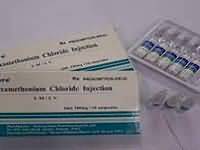Colchicine

Colchicine
CLINICAL USE
Acute gout Short-term prophylaxis during initial therapy with allopurinol and uricosuric drugsProphylaxis of familial Mediterranean fever (unlicensed)DOSE IN NORMAL RENAL FUNCTION
Acute: 1 mg then 500 micrograms every 4 hours until pain relieved or vomiting/diarrhoea occurs. Maximum of 6 mg per course. Do not repeat course within 3 daysShort-term prophylaxis: 500 micrograms 2–3 times per dayProphylaxis of familial Mediterranean fever: 0.5–2 mg dailyPHARMACOKINETICS
DOSE IN RENAL IMPAIRMENT
GFR (mL/MIN)
DOSE IN PATIENTS UNDERGOING RENAL REPLACEMENT THERAPIES
IMPORTANT DRUG INTERACTIONS
Potentially hazardous interactions with other drugsAntibacterials: increased toxicity with clarithromycin and erythromycinCiclosporin: risk of myopathy or rhabdomyolysis, also increased blood-ciclosporin concentrations and nephrotoxicityADMINISTRATION
Reconstition
–Route
OralRate of Administration
–Comments
–OTHER INFORMATION
If nausea, vomiting or diarrhoea occur, stop therapyIn CKD 5, colchicine can be administered concurrently with allopurinol, but seek specialist advice
See how to identify renal failure stages according to GFR calculation
See how to diagnose irreversible renal disease
Home








